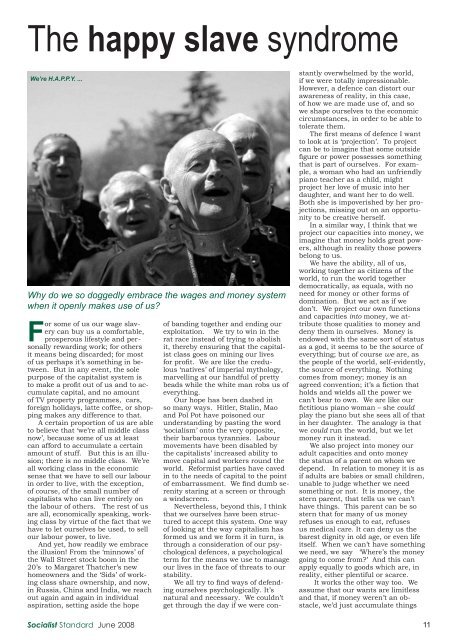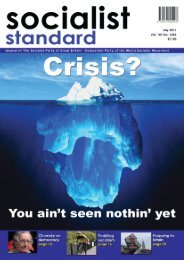Socialist Standard June 2008 - World Socialist Movement
Socialist Standard June 2008 - World Socialist Movement
Socialist Standard June 2008 - World Socialist Movement
Create successful ePaper yourself
Turn your PDF publications into a flip-book with our unique Google optimized e-Paper software.
The happy slave syndrome<br />
We’re H.A.P.P.Y. ...<br />
Why do we so doggedly embrace the wages and money system<br />
when it openly makes use of us<br />
For some of us our wage slavery<br />
can buy us a comfortable,<br />
prosperous lifestyle and personally<br />
rewarding work; for others<br />
it means being discarded; for most<br />
of us perhaps it’s something in between.<br />
But in any event, the sole<br />
purpose of the capitalist system is<br />
to make a profit out of us and to accumulate<br />
capital, and no amount<br />
of TV property programmes, cars,<br />
foreign holidays, latte coffee, or shopping<br />
makes any difference to that.<br />
A certain proportion of us are able<br />
to believe that ‘we’re all middle class<br />
now’, because some of us at least<br />
can afford to accumulate a certain<br />
amount of stuff. But this is an illusion;<br />
there is no middle class. We’re<br />
all working class in the economic<br />
sense that we have to sell our labour<br />
in order to live, with the exception,<br />
of course, of the small number of<br />
capitalists who can live entirely on<br />
the labour of others. The rest of us<br />
are all, economically speaking, working<br />
class by virtue of the fact that we<br />
have to let ourselves be used, to sell<br />
our labour power, to live.<br />
And yet, how readily we embrace<br />
the illusion! From the ‘minnows’ of<br />
the Wall Street stock boom in the<br />
20’s to Margaret Thatcher’s new<br />
homeowners and the ‘Sids’ of working<br />
class share ownership, and now,<br />
in Russia, China and India, we reach<br />
out again and again in individual<br />
aspiration, setting aside the hope<br />
<strong>Socialist</strong> <strong>Standard</strong> <strong>June</strong> <strong>2008</strong><br />
of banding together and ending our<br />
exploitation. We try to win in the<br />
rat race instead of trying to abolish<br />
it, thereby ensuring that the capitalist<br />
class goes on mining our lives<br />
for profit. We are like the credulous<br />
‘natives’ of imperial mythology,<br />
marvelling at our handful of pretty<br />
beads while the white man robs us of<br />
everything.<br />
Our hope has been dashed in<br />
so many ways. Hitler, Stalin, Mao<br />
and Pol Pot have poisoned our<br />
understanding by pasting the word<br />
‘socialism’ onto the very opposite,<br />
their barbarous tyrannies. Labour<br />
movements have been disabled by<br />
the capitalists’ increased ability to<br />
move capital and workers round the<br />
world. Reformist parties have caved<br />
in to the needs of capital to the point<br />
of embarrassment. We find dumb serenity<br />
staring at a screen or through<br />
a windscreen.<br />
Nevertheless, beyond this, I think<br />
that we ourselves have been structured<br />
to accept this system. One way<br />
of looking at the way capitalism has<br />
formed us and we form it in turn, is<br />
through a consideration of our psychological<br />
defences, a psychological<br />
term for the means we use to manage<br />
our lives in the face of threats to our<br />
stability.<br />
We all try to find ways of defending<br />
ourselves psychologically. It’s<br />
natural and necessary. We couldn’t<br />
get through the day if we were constantly<br />
overwhelmed by the world,<br />
if we were totally impressionable.<br />
However, a defence can distort our<br />
awareness of reality, in this case,<br />
of how we are made use of, and so<br />
we shape ourselves to the economic<br />
circumstances, in order to be able to<br />
tolerate them.<br />
The first means of defence I want<br />
to look at is ‘projection’. To project<br />
can be to imagine that some outside<br />
figure or power possesses something<br />
that is part of ourselves. For example,<br />
a woman who had an unfriendly<br />
piano teacher as a child, might<br />
project her love of music into her<br />
daughter, and want her to do well.<br />
Both she is impoverished by her projections,<br />
missing out on an opportunity<br />
to be creative herself.<br />
In a similar way, I think that we<br />
project our capacities into money, we<br />
imagine that money holds great powers,<br />
although in reality those powers<br />
belong to us.<br />
We have the ability, all of us,<br />
working together as citizens of the<br />
world, to run the world together<br />
democratically, as equals, with no<br />
need for money or other forms of<br />
domination. But we act as if we<br />
don’t. We project our own functions<br />
and capacities into money, we attribute<br />
those qualities to money and<br />
deny them in ourselves. Money is<br />
endowed with the same sort of status<br />
as a god, it seems to be the source of<br />
everything; but of course we are, as<br />
the people of the world, self-evidently,<br />
the source of everything. Nothing<br />
comes from money; money is an<br />
agreed convention; it’s a fiction that<br />
holds and wields all the power we<br />
can’t bear to own. We are like our<br />
fictitious piano woman – she could<br />
play the piano but she sees all of that<br />
in her daughter. The analogy is that<br />
we could run the world, but we let<br />
money run it instead.<br />
We also project into money our<br />
adult capacities and onto money<br />
the status of a parent on whom we<br />
depend. In relation to money it is as<br />
if adults are babies or small children,<br />
unable to judge whether we need<br />
something or not. It is money, the<br />
stern parent, that tells us we can’t<br />
have things. This parent can be so<br />
stern that for many of us money<br />
refuses us enough to eat, refuses<br />
us medical care. It can deny us the<br />
barest dignity in old age, or even life<br />
itself. When we can’t have something<br />
we need, we say ‘Where’s the money<br />
going to come from’ And this can<br />
apply equally to goods which are, in<br />
reality, either plentiful or scarce.<br />
It works the other way too. We<br />
assume that our wants are limitless<br />
and that, if money weren’t an obstacle,<br />
we’d just accumulate things<br />
11<br />
<strong>June</strong> 08.indd 11 20/5/08 10:39:42






